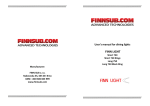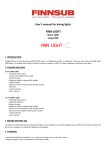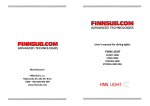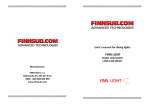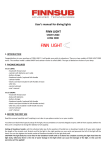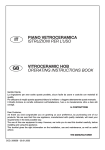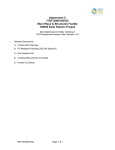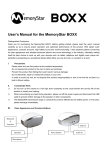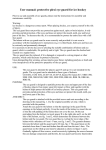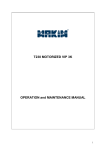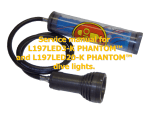Download FINN LIGHT
Transcript
//////////////////////////////////////////////////////////// //////////////////////////////////////////////////////////// User’s manual for diving lights FINN LIGHT SHORT 1400 Rings LONG 1400 Black Ring Manufacturer: FINN SUB s.r.o. Rakovecka 35, 635 00 Brno GSM: +420 606 603 999 www.finnsub.com //////////////////////////////////////////////////////////// //////////////////////////////////////////////////////////// 1. INTRODUCTION Congratulations to your purchase of FINN LIGHT lamp. It will guide your paths to adventure. There are two versions of FINN LIGHT 1400 lamps. The smaller one is SHORT and the one with a canister is LONG. The type is labeled on the box of your lamp. Serial number explanation: S = model SHORT L = canister model LONG serial number model – Ring/S S 1110116 R 2. PACKAGE INCLUDES Model LONG 1400 BLACK RING: ‐ head with thread cover ‐ canister with batteries and cable ‐ battery charger ‐ Goodman handle / optional Soft Handle ‐ canister holder ‐ elastic cord (not included in Soft Handle version) ‐ allen key ‐ service lubricant ‐ user’s manual Model SHORT 1400 RINGS: ‐ head with thread cover ‐ body with batteries ‐ battery charger ‐ Goodman handle / optional Soft Handle ‐ elastic cord (not included in Soft Handle version) ‐ allen key (not included in Soft Handle version) ‐ service lubricant ‐ user’s manual Explanation of the type indication: S = model SHORT L = canister model LONG L 1400 luminous flux ~ 1400 lumen 3. BEFORE THE FIRST USE To achieve an ideal initial capacity setup of the light, the accumulators are stored charged at aprox. 50% of their capacity. Before the first use it is important to charge the battery to full capacity. 4. CHARGING − after each use in salt water it is necessary to wash the lamp with fresh water thoroughly. Use in water : !! Warning ‐ never turn the head of the lamp clockwise (looking same way the light shines). Unscrewing the head completely leads to flooding and damaging the lamp!! ‐ Unscrew the head from the body ‐ turn it clockwise (looking same way the light shines). ‐ Plug the charger’s jack in the socket inside the lamp’s body. ‐ Plug the charger in the wall socket. The charger’s LED light is red, while the battery is being charged. Once LED turns green the accumulator is charged on approx. 80%. You can keep it on the charger longer to reach the maximum capacity). When the light is completely discharged the charging cycle lasts 4 hours in SHORT version, 8 hours in LONG version . ‐ Unplug the charger from the wall and after that jack from the lamp’s body. Save the energy. Always use only the original battery charger that is included in the package! Important notice Li‐ion batteries don’t have a memory effect. That’s one of the basic characteristics. We recommend to charge the accumulator after any usage. !! You have to avoid any situation when you keep fully discharged accumulator in a frosty environment. For example – You put a discharged accumulator in a trunk of a car after dive and keep it there for the whole night. It will lead almost absolutely to irreversible damage of the accumulator. The time of performance of the light might be significantly reduced by this only one step. The bad maintenance is not covered by the warranty and the claims of damaged accumulator because of the bad maintenance will be refused !! 5. MANUAL FOR FUNCTIONS AND USAGE ‐ before the beginning of the dive to switch on the light you have to screw the head on ‐ turn it counter‐clockwise (looking same way the light shines) − to switch off the light, unscrew the head - turn it clockwise (looking same way the light shines). When you’re switching the light off under the water, stop turning the head once the light is off. WARNING! Unscrewing the head completely leads to flooding and damaging the lamp. Therefore we recommend that you keep the light on until surfaced. 6. MAINTENANCE, STORAGE, TRANSPORT AND MANIPULATION BEFORE/AFTER DIVE Threads and o‐rings are necessary to be checked and lubricated after every dismounting and every recharging. If threads or o‐rings are dirty, they have to be cleaned and then lubricated. ! Notice: If threads and o‐rings are not lubricated, you risk water penetration and it would be difficult to switch on/off the light under hydrostatic pressure ! !! The claims of the flooded light because of the bad maintenance are not covered by the warranty !! !! Remove the head from the body/canister for transport !! There is the risk of accidental switch on. ! Prevent the risk of fire! In case of longer storage the light has to be charged to the full capacity. Don’t store the light discharged! If stored longer than 1 month the capacity could significantly decrease or the accumulator could be destroyed. Every 3 months it is necessary to discharge and then fully charge the light ! Optimal storage temperature is 15‐18°C (59 – 65°F). Higher temperatures accelerate self‐discharge and earlier recharge is needed. The bad storage is not covered by the warranty and the claims of damaged accumulator because of the bad storage will be refused !! After each use in salt water it is necessary to wash the light with the fresh water. 7. TECHNICAL SPECIFICATION Luminous flux: 1400 lumens Temperature of light: cold white, 5000 – 8300 K Cells type: Lithium‐Ion Input voltage: 16,8 V Output current: 1350 mA Run‐times: Short: 2,5 hrs Long: 4,5 hrs Both models are guaranteed for usage up to ‐200 msw (655 ft). 8. DISPOSAL OF AGED LAMPS Dispose functionless and aged lamp in a proper way. Bear in mind that it is an electronic waste. Do not throw it into a regular trash. You can return the appliance to your dealer. 9. SAFETY INSTRUCTIONS !! Store and transport both parts of the light separated – unscrew the head from the body of the light. Otherwise the light could be accedentally switched on in the bag which could cause the fire !! !! Don’t put switched on light on the flammable surfaces. There is the risk of the fire požáru !! WARNING! The light which si switched off left on the sunshine could reach very high temperatures (over 60°C). The light can be destroyed or the heat surface of the light could burn the user. Therefore NEVER leave the light on the direct sunshine if the weather temperature is high (for example in the car). There is the risk of the damage of the light, burn of the user or fire! Do not put the activated lamp on flamable surfacs to prevent risk of fire.




